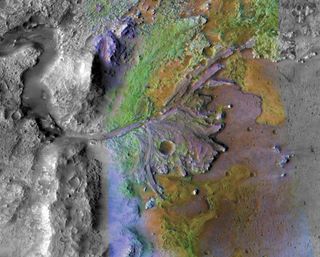Wet, Frozen Conditions on Ancient Mars Could Have Supported Life

3 to 4 billion years ago, it was warm enough on Mars to spark major rainstorms and flowing water, which would have frozen shortly after, a new study has found. This could serve as evidence that simple life may have developed on Mars at a similar time that it developed on Earth.
It is not new information that Mars was once home to an abundance of water. But it has remained somewhat of a mystery whether the water on Mars was mostly liquid or frozen as ice, and how this may have changed over time. Warmer temperatures on Mars would not only signify the presence of liquid water, warmer conditions also make it more likely that life could have formed independently on the planet.
One new study compares patterns on the surface of Mars made by mineral deposits with similar patterns on Earth in a wide variety of environments in locations including the Oregon Cascades, Hawaii and Iceland. The Earth data was compared to Martian mineral data collected by the Curiosity rover and the NASA CRISM spectrometer, which is currently aboard the Mars Reconnaissance Orbiter circling the planet.
Related: The Search for Life on Mars (a Photo Timeline)
By analyzing these patterns, scientists found evidence that Mars had at least one long period of severe rainstorms and flowing surface water which was followed by temperatures that froze this water.
"If this is so, it is important in the search for possible life on Mars," Briony Horgan, a co-investigator on the Mars 2020 mission who presented this work at the Goldschmidt Geochemistry Conference in Barcelona, Spain earlier this week (Aug. 19), said in a statement.
"We know that the building blocks of life on Earth developed very soon after the Earth's formation, and that flowing water is essential for life's development. So evidence that we had early, flowing water on Mars, will increase the chances that simple life may have developed at around the same time as it did on Earth," she added.
Get the Space.com Newsletter
Breaking space news, the latest updates on rocket launches, skywatching events and more!
This study is a stepping stone to understanding the history of water on Mars and how the planet's climate has changed over time. But, while it adds to evidence that conditions on Mars may have been capable of supporting life at certain points throughout the planet's history, there is still much to discover and explore.
NASA's Mars 2020 mission aims to address key questions surrounding the search for life on the Red Planet. Set to launch in July, 2020, and land on Mars in Jezero Crater, the Mars 2020 rover will collect data that could support the findings in this study.
"We hope that the Mars 2020 mission will be able to look more closely at these minerals, and begin to answer exactly what conditions existed when Mars was still young," Horgan said.
- Photos: Ancient Mars Lake Could Have Supported Life
- 6 Most Likely Places for Alien Life in the Solar System
- 7 Biggest Mysteries of Mars
Follow Chelsea Gohd on Twitter @chelsea_gohd. Follow us on Twitter @Spacedotcom and on Facebook.
Join our Space Forums to keep talking space on the latest missions, night sky and more! And if you have a news tip, correction or comment, let us know at: community@space.com.

Chelsea “Foxanne” Gohd joined Space.com in 2018 and is now a Senior Writer, writing about everything from climate change to planetary science and human spaceflight in both articles and on-camera in videos. With a degree in Public Health and biological sciences, Chelsea has written and worked for institutions including the American Museum of Natural History, Scientific American, Discover Magazine Blog, Astronomy Magazine and Live Science. When not writing, editing or filming something space-y, Chelsea "Foxanne" Gohd is writing music and performing as Foxanne, even launching a song to space in 2021 with Inspiration4. You can follow her on Twitter @chelsea_gohd and @foxannemusic.
